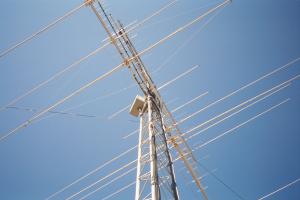
N5XU participated in the ARRL September VHF QSO Party conducted from 1800 UTC 11 September 1999 to 0300 UTC 13 September 1999. We operated in the limited multioperator class, with N3TNN/5 and KM5FA operating. We were active on 50 MHz, 144 MHz, 222 MHz, 432 MHz, and 1296 MHz.

|
This is the first VHF contest at N5XU where we broke 10K points without a big opening on six meters. We were pretty close to 10K Sunday night, when we had a brief burst of Eskip to Virginia, Maryland, North Carolina, Tennessee, and South Carolina in the very last hour of the contest that resulted in 17 contacts and 12 new grid multipliers, which pushed us over the top. But the opening was really only two bursts of contacts, each about ten minutes long.
This was also our first outing on 1296 MHz, where we did much better than we had expected. We made eight contacts with six different grid squares, getting us in one weekend almost 25% of the way to VUCC on that band. If you were to add the 1.2 GHz contacts to our score, it would make for more than 15K points, but it would also require us to enter in the Unlimited Multi-operator category, one in which we likely won't be competitive until we start adding more microwave bands.
| Band Removed | Resulting Score |
|---|---|
| 50 MHz | 9,065 |
| 144 MHz | 8,262 |
| 222 MHz | 10,915 |
| 432 MHz | 9,177 |
| 1296 MHz | 12,736 |
So, for this contest, it looks like 144 MHz was the most important band, followed by 50 MHz, 432 MHz, 222 MHz, and 1296 MHz in that order. This is a little unusual, as 50 MHz typically is more important than 144 MHz, but conditions locally on six meters were down from previous contests. Conditions on 222 and 432 MHz, though, were _great_. We worked more stations and multipliers on those two bands than we ever have before, and we even worked more than the W5KFT VHF contest superstation did last year in this contest. Had it not been for the bursts of E skip in the last hour of the contest, 50 MHz would have been the dropped band. As it was, 50 MHz was only marginally more important to our score than 432 MHz.
Having 1.2 GHz was a lot of fun. We made at least three contacts in the 150+ mile range, with K5IUA and K5DDD, both near Houston, and AB5SS, a rover entrant, as he was travelling way out to our northwest. Our closest contact was about five miles away as N0LNO. another rover, gave us a sideband contact from a parking lot near the intersection of I-35 and 290. On 432, the best DX was KC5FP in EL16, somewhere between Corpus Christi and Brownsville. We almost worked XE2OR in DL98 on 432MHz, but QRM was too heavy. On 222 MHz, we worked numerous all-time-new grids, mostly thanks to rovers, and had a blast racking up our best numbers ever. On 144 MHz, we did work XE2OR in northern Mexico, K5ACR in Oklahoma, and K5EMP in Louisiana. Unfortunately, we were unable to complete several contacts on 222 because we don't have an amplifier, and on all of the bands because the other station either didn't know the Morse code, or didn't have a key with which to send it.
| Frequency | QSOs | Points | Grids |
|---|---|---|---|
| 50 MHz | 38 | 38 | 21 |
| 144 MHz | 61 | 61 | 19 |
| 222 MHz | 20 | 40 | 11 |
| 432 MHz | 31 | 62 | 13 |
| 1296 MHz* | 8 | 24 | 6 |
| Total | 150 | 199 | 64 |
* Submitted as check log only, not included in totals
| Claimed score | 12,736 |
|---|
Contest Logging was done with TR LOG contest logging software. The following reports and log were created using TR Log's post-contest processor.
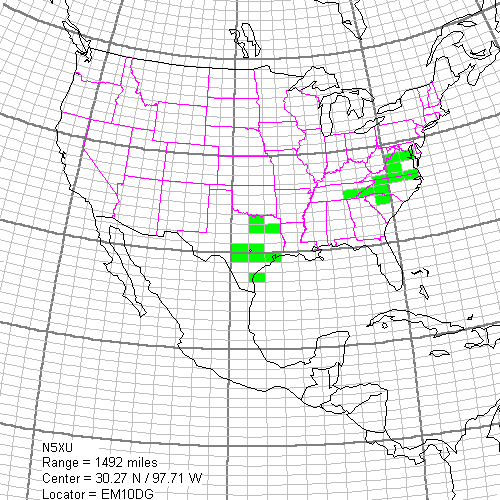
Grids worked: EL09, EL17, EL19, EL29, EM00, EM10, EM12, EM13, EM22, EM75, EM85, EM94, EM95, EM96, FM06, FM07, FM08, FM16, FM18.
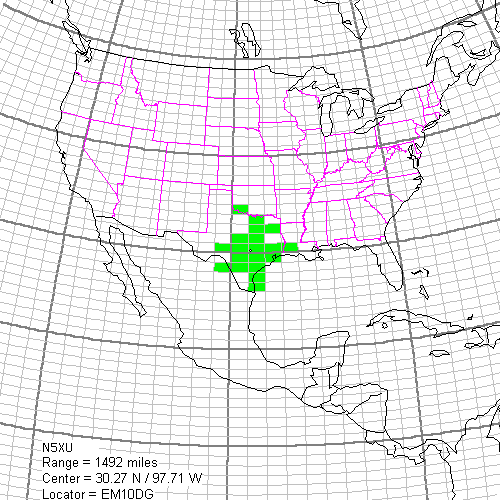
Grids worked: DL98, DM90, EL08, EL09, EL16, EL17, EL18, EL19, EL29, EM00, EM01, EM04, EM10, EM11, EM12, EM13, EM20, EM22, EM30
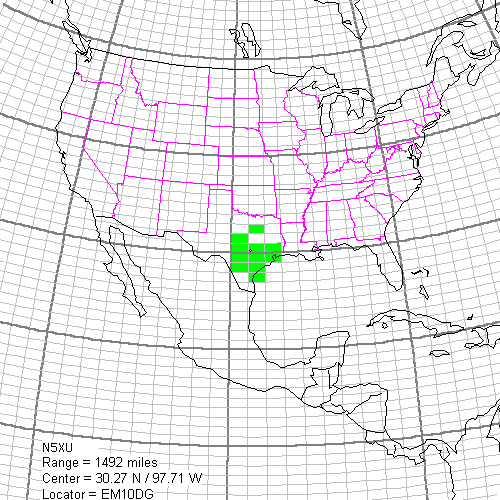
Grids worked: EL08, EL09, EL17, EL18, EL19, EL29, EM00, EM01, EM10, EM12, EM20
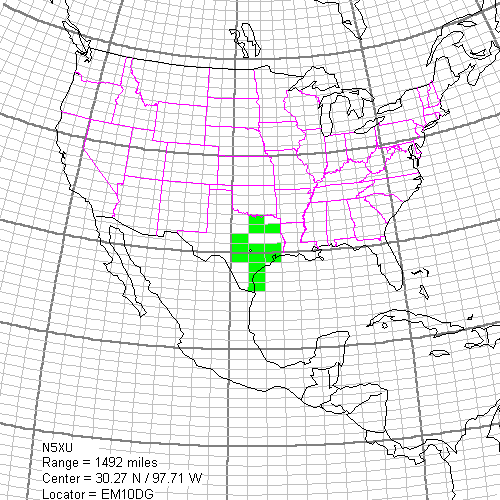
Grids worked: EL09, EL16, EL17, EL18, EL19, EL29, EM00, EM01, EM10, EM12, EM13, EM20, EM22
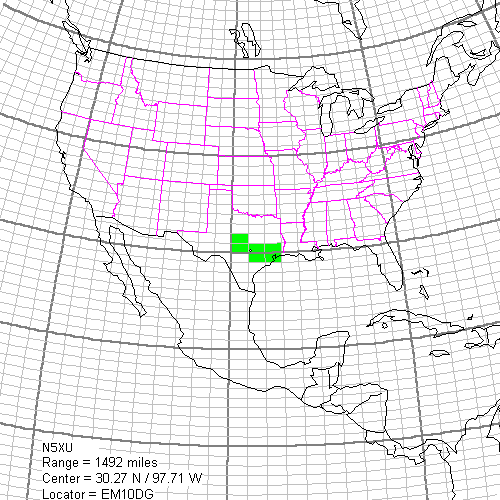
Grids worked: EL19, EL29, EM00, EM01, EM10, EM20
|
Last Updated 26 June 2020 wm5r@wm5r.org |